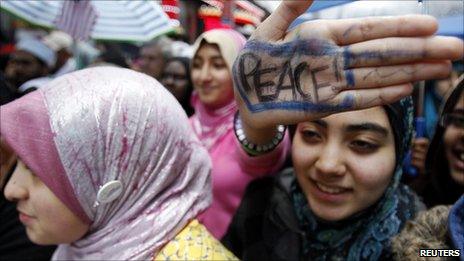US Muslims protest over hearings
- Published

Muslims braved the rain to protest in New York
Several hundred people have gathered in New York's Times Square to protest at this week's Congressional hearings on the US Muslim community.
The hearings will look at the extent of radicalisation within the community and the response on that issue of Muslim leaders.
Muslim organisations say they are being unfairly singled out.
The hearings are in response to such events as the Fort Hood shootings and the Times Square car bomb plot.
'Xenophobic behaviour'
The BBC's Tom Burridge in Washington says the protesters braved the rain to march on the streets of New York, many carrying banners reading "Today I am a Muslim too".
In the hearings, Peter King - a Republican Congressman and chair of the homeland security committee - has called several witnesses to testify about "the extent of radicalisation within the American Muslim community".
Mr King, who represents New York, claims some Muslim leaders are not doing enough to help the police and the FBI investigate terror plots which originate in the US.
Our correspondent says cases such as that of Pakistan-born US citizen Faisal Shahzad, who tried to blow up a car bomb in New York's Times Square last year, and Virginia-born US army Maj Nidal Hasan, who allegedly killed 13 people on a shooting spree at Fort Hood, Texas, in 2009, have changed political language and thinking in the US.
Politicians, the police and people are talking about a relatively new, homegrown threat, he says.
The protesters in New York and others fear the hearings will only increase Islamaphobia in America.
Hip-hop mogul Russell Simmons and Imam Feisal Abdul Rauf, who led the campaign to build an Islamic centre near the destroyed World Trade Center site, addressed the Times Square crowd.
"Our real enemy is not Islam or Muslims," said Imam Rauf. "The enemy is extremism and radicalism and radical ideology."
Muslim Democratic Congressman Andre Carson said he wanted to tell "the Peter Kings of the world, we will not take your xenophobic behaviour".
Mr King's language on this subject has often proved inflammatory, our correspondent says, and many believe the witnesses he has called to speak at the hearings do not represent mainstream Muslims.